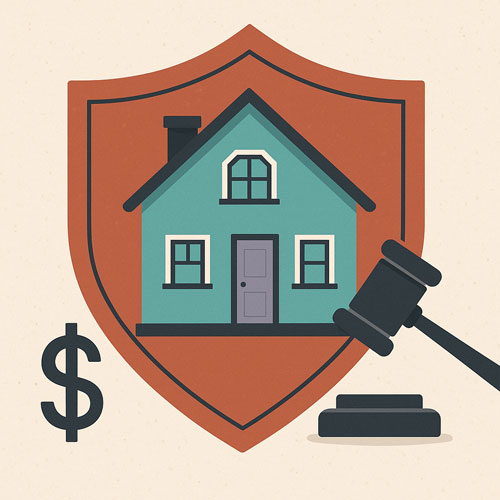Submitted by the Bond & Botes Law Offices - Thursday, September 25, 2025

Learn how Chapter 13 bankruptcy in Alabama and Mississippi can protect your home—even if you’re not on the mortgage—and why working with an experienced bankruptcy attorney is critical.
Living in a Home Without Being on the Mortgage
Many families in Alabama and Mississippi live in homes where only one spouse (or sometimes a deceased parent) signed the mortgage. You may be paying for the upkeep, contributing to household bills, and treating the property as your home, yet your name isn’t on the note. This raises an important question:
Can you still protect your home in bankruptcy if you aren’t on the mortgage?
In many cases, the answer is yes. Through a Chapter 13 bankruptcy, you may be able to stop foreclosure, catch up missed payments, and continue living in your home—even without your name on the mortgage.
The Legal Foundation
The U.S. Supreme Court case Johnson v. Home State Bank made it clear that even if someone has no personal liability on a mortgage note, the lien against the property still counts as a “claim” that can be handled in bankruptcy.
This means that if you have an ownership or marital interest in the property—whether by deed, inheritance, or marriage—you may be able to use Chapter 13 to protect your home from foreclosure.
Why This Matters
Without bankruptcy protection, a lender could foreclose even if your family depends on the home. Chapter 13 offers a lifeline by allowing you to:
-
Stop foreclosure immediately through the automatic stay
-
Catch up missed mortgage payments over three to five years
-
Maintain current mortgage payments while staying in the home
-
Protect your equity and rights of ownership, even if you never signed the note
The Importance of an Experienced Bankruptcy Attorney
Not every situation is simple. Courts may look closely at whether you have a real ownership or equitable interest in the home. Some cases are straightforward, while others involve tricky legal arguments.
An experienced bankruptcy attorney will:
-
Review your ownership or marital interest in the home
-
Apply the right case law, including Johnson v. Home State Bank
-
Build a Chapter 13 plan that protects your home and meets court requirements
-
Handle objections from the mortgage lender and protect your rights
Without experienced guidance, it’s easy to make a mistake that could cost you your home.
Frequently Asked Questions
-
Can I file Chapter 13 to save my home if I’m not on the mortgage?
Yes. If you have a legal or equitable interest in the property, Chapter 13 may allow you to stop foreclosure and pay back missed payments, even if you are not personally liable on the note.
-
What case law supports this right?
The Supreme Court’s decision in Johnson v. Home State Bank held that a mortgage lien is still a valid claim in bankruptcy, even without personal liability. Courts across the country rely on this principle to allow debtors to protect homes they own but are not on the note for.
-
Does this apply in Alabama and Mississippi?
Yes. Bankruptcy courts in Alabama and Mississippi generally follow this approach. If you have an ownership interest, you may be able to use Chapter 13 to save your home.
-
Why do I need a bankruptcy attorney for this?
Because every case is different. An experienced attorney will determine whether you have the kind of ownership interest needed and craft a plan to protect your home while complying with the law.
Final Thoughts
Even if you didn’t sign the mortgage, Chapter 13 bankruptcy may provide the lifeline you need to keep your home. But success depends on how the law applies to your situation. Having an experienced bankruptcy attorney by your side makes all the difference.
At the Bond & Botes Law Offices, we’ve been helping families across Alabama and Mississippi protect their homes for more than 35 years. We know the courts, the law, and how to fight for your future.
Phone: 877-581-3396
Email: Click Here to email us through our website
Website: https://www.bondnbotes.com
This post is intended for general information only and does not constitute legal advice. To discuss your specific situation, we encourage you to schedule a confidential consultation with an attorney.

 1-877-581-3396
1-877-581-3396

